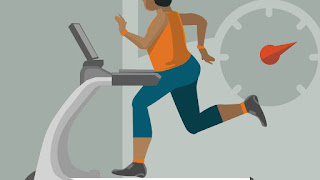12 WAYS TO PREVENT TYPE II DIABETES
Physical activity can lower your blood sugar up to 24 hours or more after your workout by making your body more sensitive to insulin. Checking your blood sugar level more often before and after exercise can help you see the benefits of the activity.
When you initiate exercise, your body releases stress hormones, which can briefly raise your blood sugar. If you have diabetes and your body doesn't manage blood sugar well, it can increase too much during the first half-hour of exercise before it begins to lower.
If you have type 2 diabetes, you should aim for about 30 minutes of exercise at least five days a week, according to the American Diabetes Association. However, if you're like many newly diagnosed type 2 diabetics, you may not have exercised in a long time.
When you exercise, your muscles need more sugar to supply energy. Moderate to intense exercise may cause your blood sugar to drop during exercise and for the next 24 hours following exercise.
When you exercise, your muscles need more sugar to supply energy. Moderate to intense exercise may cause your blood sugar to drop during exercise and for the next 24 hours following exercise.
Inactivity and having excess weight overweight go hand-in-hand with a diagnosis of type 2 diabetes. Muscle cells have more insulin receptors than fat cells, so an individual can decrease insulin resistance by exercising. Being more active also lowers blood sugar levels by helping insulin to be more effective.
Being overweight or obese increases a person's risk of developing type 2 diabetes. Also, weight gain in people with type 2 diabetes makes blood sugar levels even harder to control. People with type 2 diabetes have a condition called insulin resistance. So, the amount of glucose in the blood rises.
3. BALANCED DIET:
By eating a balanced diet, and avoiding foods rich in sugar, simple carbohydrates, and unhealthful fats, a person can better control their blood sugar and insulin levels. A science-based formula to lower blood sugar, lose weight, and live a longer, more energetic life.
HEALTHY DIET AND LOW CARBOHYDRATE ARE NECESSARY FOR TYPE II DIABETES PATIENT.
IF YOU HAVE DIABETES YOU SHOULD FOCUS TO EAT:-
LEAN PROTEIN,
HIGH-FIBER,
LESS PROCESSED FOOD,
LESS CARBOHYDRATE,
FRUITS,
VEGETABLES,
LOW FATTY FOODS,
NUTS.
***TYPE II DIABETES PATIENT SHOULD AVOID -------
SUGAR
SWEETENED BEVERAGES
TRANS FATS
PROCESSED FOODS
WHITE BREAD
HONEY
VITAMIN & MINERALS RICH FOODS ARE VERY IMPORTANT FOR TYPE II DIABETES PATIENT.
VITAMIN- A, B-COMPLEX, C, E
MINERALS-- MAGNESIUM, ZINC ETC.
a ketogenic or very-low-carb diet can help you avoid diabetes.
5. DON'T DRINK ALCOHOL:
Alcohol can interfere with blood sugar levels. Excessive consumption can reduce the effectiveness of insulin. People with diabetes should sip drinks slowly and not drink on an empty stomach.
6. QUIT SMOKING:
In the long term, blood sugar levels gradually decreased. By three years, the diabetics who quit smoking had blood sugar levels similar to the people who kept smoking. The benefits of quitting smoking dramatically outweigh any potential extra, short term risk of having higher blood sugars.
7. DRINK WATER:
Drinking extra water will not dilute your blood sugar levels if you are already fully hydrated. However, being dehydrated can cause blood sugars to concentrate and subsequently rise. ... Drinking 8 glasses of water a day appears to bring down one's blood sugars by reducing insulin resistance due to proper hydration.
8. MANAGE YOUR STRESS:
Stress can be a major barrier to effective glucose control. Stress hormones in your body may directly affect glucose levels. ... Constant stress from long-term problems with blood glucose can also wear you down mentally and physically. This may make managing your diabetes difficult.
9. QUALITY SLEEP:
Sleep can affect your blood sugar levels, and your blood glucose control can also affect your sleep. ... As the number of sleep decreases, blood sugar increases, escalating the issue. Lack of sleep has been shown to increase blood sugar levels and the risk of diabetic issues.
10. AVOID SEDENTARY BEHAVIORS:
It's important to avoid being sedentary if you want to prevent diabetes.
If you get no or very little physical activity, and you sit during most of your day, then you lead a sedentary lifestyle.
Observational studies have shown a consistent link between sedentary behavior and the risk of diabetes.
Changing sedentary behavior can be as simple as standing up from your desk and walking around for a few minutes every hour.
Vitamin D is important for blood sugar control.
Indeed, studies have found that people who don't get enough vitamin D, or whose blood levels are too low, have a greater risk of all types of diabetes.
Good food sources of vitamin D include fatty fish and cod liver oil. In addition, sun exposure can increase vitamin D levels in the blood.
DRINK COFFEE OR TEA:
Although water should be your primary beverage, research suggests that including coffee or tea in your diet may help you avoid diabetes.
----------------------------------------------------------------------------------------
thank you


























%20(1).jpeg)
%20(1).jpeg)